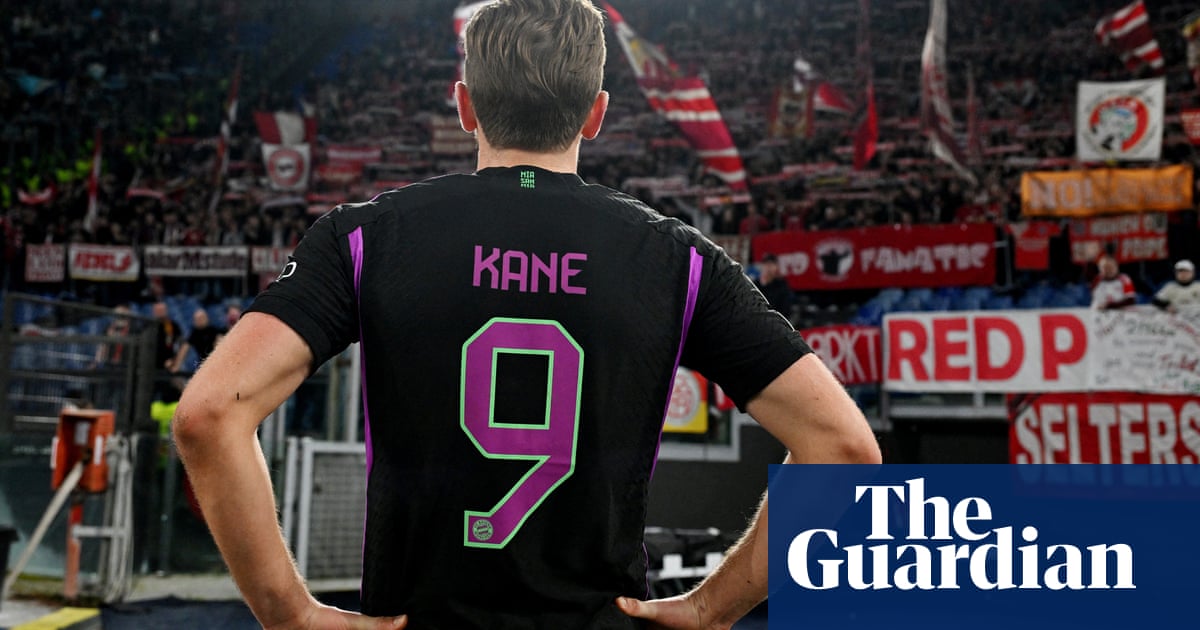
First you need the vision. “Around the pitch I want to be an artist,” Jude Bellingham says, which is the sort of quote that makes you double-take, because what footballer even talks about making art these days? Well Geoff, at the end of the day it’s all about engaging in a search for deeper meaning, washing away from the soul the dust of everyday life, creating a new kind of sense where none previously existed. Fortunately, on this occasion, the big man’s got his head on it.
And perhaps the most thrilling thing about watching Bellingham at the moment is not the goals (11 in all competitions) or the assists (four) or the celebrations (broad, open-armed, inviting us to embrace him), but that little gap between the moment of creation and the moment of realisation. When he’s trapped by the touchline and plotting his escape route. Or the shuffle that shifts the ball out of his feet and opens up whole new dimensions of possibility. You don’t know how this ends, because nor does he.
Last week, the Spanish newspaper Marca published an entire article about Bellingham’s tongue. The gist was this: Bellingham’s tongue hangs out when he runs. Michael Jordan also stuck his tongue out. So did Einstein. So did the Rolling Stones logo. Conclusion: Bellingham = genius. And perhaps this is the sort of thing that happens when an athlete begins to inhabit a plane where people simply want to consume them, absorb them, plug them into their day like a glow lamp.
Certainly there is a strange and devotional purity to the way Real Madrid fans have taken to Bellingham since his move this summer. It can’t just be the goals, because scoring goals isn’t really his job, and it can’t simply be the talent, because never in nine years at Madrid was Gareth Bale as adored. Perhaps it chimes with this idea of football as expression, football as a vehicle of joy, football as a journey without maps or endings. I don’t know if Bellingham is the best player in the world right now. But he’s undeniably the most evocative and joyful.
At which point, with sighs, Bellingham must now peel off his superhero suit, slip on a blue training top and start playing sideways passes to Harry Maguire. And if Bellingham at Madrid is a love story in its first bloom, then Bellingham with England is a slightly more complex and awkward prospect. Here the window of possibility feels narrower, the demands sharper and more urgent. Inspire us. Transform us. Win us something. Take Gareth Southgate’s sad song and make it better.
Partly this is simply the nature of international football, a world defined by its abrupt endings and screeching climaxes, where absolutely nobody is trying to create art. But partly, too, it is the natural dissonance between a man so clearly at the start of his England journey and a man so clearly near the end of his. A man trying to create art, and a man trying to squeeze the last drops out of a job from which he already seems to be plotting his exit. In short: what happens when the most exuberant and exciting force in English football collides head-on with its least?
We caught a glimpse of this at Southgate’s squad announcement last week, when the England manager was asked about Bellingham’s recent displays for Madrid. “He’s been defending on the left wing in a couple of games,” Southgate said. “I can just imagine the reaction from all and sundry if I asked him to do that.” A joke, but a bitter joke, a telling and weirdly uncharitable joke, borne largely of ennui and resentment. And this appears to be the default Southgate tune these days, whether complaining about VAR or wincing in the face of questions about Saudi Arabia and LGBT rights: less the figurehead of a national team in the national sport, more a middle-ranking bank employee carefully explaining the pros and cons of an offset mortgage.
And really this is not so much an issue of strategy as tone. Declan Rice will never be Luka Modric and Kalvin Phillips will never be Eduardo Camavinga, but the win over Scotland – albeit against weaker opposition in a friendly – was a good example of how to set Bellingham’s attacking threat loose without sacrificing cover. The wider problem here is the sense of sourness and indifference that began to set into Southgate’s England around the second half of 2021: a narrowing of horizons, a retreat from the expression and purpose that briefly made them one of the most thrilling England teams of my lifetime.
I’m not an expert in tactics or coaching. I’m not really qualified to tell Southgate what formation to use or who he should deploy at midfield pivot. Handbrake on, handbrake off; whatever. But I do know that not long ago this was an England team that used to make you feel things, led by a man who seemed to embody the best of us.
Somewhere along the line, ridiculously, a team containing Bellingham and Bukayo Saka and Marcus Rashford and Phil Foden and Trent Alexander-Arnold and Jack Grealish lost its ability to convey joy. And it probably happened when its coach, burned by one too many stinging criticisms, started fixating on endings.
Fortunately, Southgate has a guy who gets it. Who wants to win as much as everyone, but wants to sweep people off their feet as he does it. Who understands how to connect with people, who wants to inspire and create. And perhaps ultimately Southgate’s legacy will be defined by the extent to which he can lean into the joy of Jude, to channel this generational talent and its world without limits.
Because if Bellingham teaches us anything, it is that the best way of scripting the perfect ending is to play like there are no endings at all.












